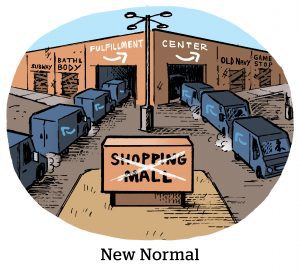Here’s today’s AdExchanger.com news round-up… Want it by email? Sign up here.
Uncapped
Streaming TV viewers know what it’s like to be hounded by an ad for days or weeks at a time.
Shira Ovide of The Washington Post explores how to avoid this unfortunate phenomenon – although it’s not an encouraging report.
People can jump from one streaming service to another when they’ve seen one commercial too many times, or they can pay up for an ad-free subscription. And some smart TVs have the option to turn off personalized ads – which, it should be noted, doesn’t prevent first-party data targeting by the likes of Amazon, Roku or YouTube.
Another option is to gripe to customer support or complain publicly on social media. If the streamer still doesn’t fix the issue, then drop the service.
But none of these tactics address the problem of ad oversaturation. In other words, if you’re annoyed … maybe read a book instead?
Still, if enough people take action by deleting a streaming app and/or leaving pissed-off reviews, that could help turn the tide.
“If people switch services because of bad ads, the services will fix that,” Simulmedia CEO Dave Morgan tells WaPo.
IAC? More Like “Give It A Try-AC”
Dotdash Meredith, which is owned by IAC, recently launched an ad targeting product called D/Cipher that relies on first-party intent data rather than third-party cookies.
It has access to this first-party data because Dotdash Meredith is a content fortress made up of roughly 40 owned-and-operated publishing brands.
Not a bad position to be in on the eve of Chrome’s third-party cookie phaseout and Apple’s ongoing privacy changes.
Google helped blaze the trail for D/Cipher, IAC CEO Joey Levin told investors during the company’s Q2 earnings call on Wednesday. Intent data, long Google’s jam, has historically outperformed demographic and cookie targeting for Dotdash Meredith. “Intent is a very meaningful signal,” Levin said.
But unlike Google, IAC doesn’t own the world’s default search engine. And getting advertisers to test post-cookie identity solutions is a heavy lift, let alone moving from the testing phase to spending serious campaign budgets.
“And so we’re now proving that for advertisers,” Levin said. “The key for us is just getting advertisers to give it a try, and then we can move the ROI.”
Disney’s Fairytale Ending?
Could Apple buy Disney?
Rumor has it that a deal could materialize, per The Hollywood Reporter.
Of course, that rumor is decades old and resurfaces whenever Disney’s riding the struggle bus.
Like, who else could afford Disney?
With $62 billion in cash and a $2.8 trillion market cap, Apple’s nearly the only company with deep enough pockets to even consider purchasing the entertainment behemoth. But even if Apple takes that plunge, any potential deal would be closely scrutinized by every market competitor and M&A regulator.
Still, there’s a reason why this rumor has legs.
Apple once had a strong personal tie to Disney in the form of Steve Jobs (a former Pixar CEO and Disney board member). Plus, Disney CEO Bob Iger was on the Apple board prior to the launch of Apple TV+.
Oh, and “one more thing”: Despite having hit a rough patch – Disney+ is burning cash, and the theme parks now draw fewer visitors – it controls a treasure trove of IP and entertainment talent that would be very appealing to Apple.
But Wait, There’s More!
Google changes the name of its “in-stream ads” to “skippable ads” amid its ongoing inventory quality scandal. [Adweek]
Patreon podcasters can now use Spotify to distribute exclusive content. [The Verge]
How Polaroid is using influencers to pitch analog imperfection to Gen Z. [Digiday]
Amazon’s evolution from retailer to retail services provider. [Marketplace Pulse]













